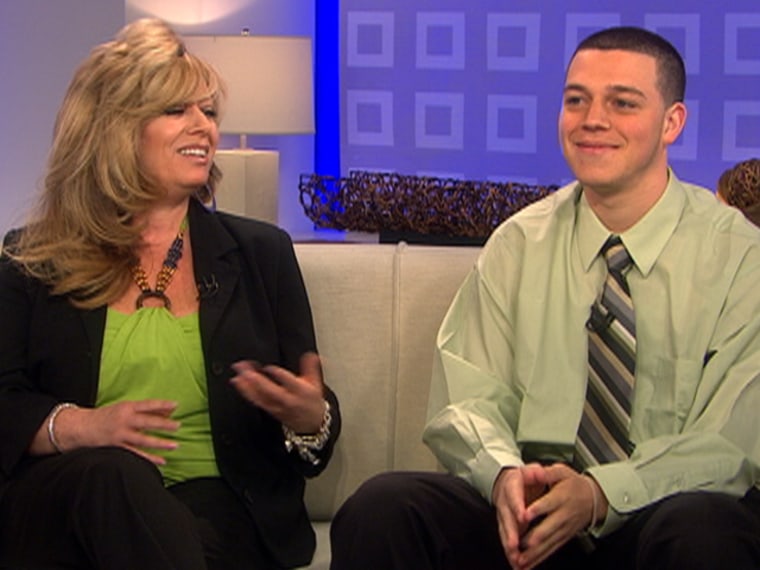When the NBC affiliate in Philadelphia suggested that students in the area try giving up their cell phones, computers, iPods and video games for 10 days, David Silver didn’t think much of the idea. Live without text messages? He couldn’t do that for an hour, much less 10 days.
But David finally decided to join a group of his classmates in a grand experiment. He kissed his cell phone goodbye and, just like that, went from 14,000 text messages a month to zero. On Monday, he and his mother, Rhonda Silver, visited with TODAY’s Matt Lauer to talk about how it all turned out.
“On a scale of one to 10, how hard was this?” Lauer asked.
“Actually, it was probably a three — very surprisingly,” the Philadelphia teenager said.
From Facebook to face-to-face
The biggest challenge was figuring out what to do with all the time he now had on his hands. For the first time since he got his phone, he found himself having to resort to conversing with his mother at dinner and going out to visit his friends in the flesh at their homes.
David told Lauer that texting and communicating with his friends on Facebook was his default activity.
“It was when you’re sitting at home, usually at night when you have nothing to do, and I would sit on my phone, the computer, just talk to all my friends,” he said. “I had to figure something to do with my time now.”
He described the experience as “chaos … just because you don’t know what to do, so you’re freaking out sometimes.”
David started going to the gym, just to have something to do. He also did his homework, especially calculus, which he was having a hard time with. To his amazement, after studying without distractions, he got a 95 in a quiz and actually understood the subject.
“Much to my surprise and pleasure, they had done all of their homework,” Jan Dunner, the teacher who supervised the experiment, told NBC News.
30 texts per hourLauer asked Rhonda Silver how she ever let her son get to the stage where he was averaging 467 text messages a day, which comes to nearly 30 per waking hour.
“He wasn’t with me. That was the whole problem,” she said. “All of those hours spent texting, he could have been with the family — not the whole time, but just basically chit-chatting like he used to. I kind of missed David.”
Even when he was with his mom and 21-year-old sister at the dinner table, David spent all his time texting instead of conversing.
When he gave up his cell phone, he found he was annoyed at how rude it was of his sister to be texting during dinner.

“I think the biggest change was that he communicated with the family again,” David’s mom, Rhonda Silver, said. “We reconnected on what his plans were for the prom, and who he’s been socializing with.”
In addition, because David couldn’t text his friends, they had to meet in person. “I got to meet some of his friends, which was very interesting,” David’s mother said.
A question of balanceThe Silvers were joined by psychologist Michelle Callahan, who felt that the Philadelphia experiment presents a great lesson for teens and their parents.
“This story is such a perfect example of how, if you put limits on how much technology your kids are allowed to use and the amount of time they spend on it, it has a huge positive effect on the family and in the child’s life,” Callahan asserted.
David and his classmates went cold turkey. However, Callahan said, it’s not necessary to give up electronic communications entirely, just to strike a balance.
“I think it’s just a matter of managing the amount of time. Make sure your kids get home and do their homework first. Make sure they’re spending time with the family,” Callahan said.
“There should be hours or time when you’re doing certain things that it’s just family time,” she added. “Maybe it’s dinner. Maybe you go out for a certain activity, you say, ‘Look, you can text in the car, but when we get there, put your phone away.’ [Pick] certain things the family’s going to do together and say, ‘No text while we do this.’ ”
Lauer asked Rhonda Silver if she intends to put limits on her son’s texting now that the experiment is over and he’s back using all the minutes his father pays for.
“I think he is going to impose the limits himself,” she said. “He’s aware of it now. It’s enough with the screaming. Things are going to improve.”
Lauer asked David if he agreed that his texting would decrease.
“I think I might,” he said, not sounding entirely convinced. “It would be tough. I don’t know.”